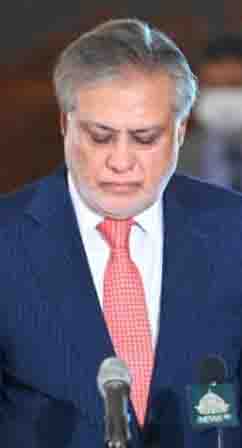Pakistanis should get ready to brace for tougher times as inflation which hit 27.6 percent in January — the highest since May 1975 – is all set to climb up to 35 to 40 percent mainly on the back of an unprecedented increase in the energy prices, a sharp devaluation of the rupee against the dollar and higher taxes.
The country’s economic woes have dramatically worsened under the stewardship of Finance Minister Ishaq Dar, who took charge of his assignment in September last year, making tall claims of bringing down the Pakistani rupee to around 200 to a dollar from the highs of 239 at that time and engaging the International Monetary Fund (IMF) on equal terms. But just five months down the road, the so-called “Dar-nomics” has fallen flat on its face, not just sinking the political fortunes of the Shehbaz Sharif government, but also damaging Pakistan through wrong choices and inaction on many fronts.
Dar’s decision to artificially prop up the rupee created a thriving black market, which resulted in a sharp fall in the remittances as well as export proceeds from legal channels. The three-tier currency rate, which destroyed the market confidence, existed till the end January. By the time Dar was forced to give in to the market forces and the IMF demands, the damage to the country had already been done. The rupee plunged to 280 rupees to a dollar by the first week of February.

In his previous stint as finance minister under the Pakistan Muslim League-Nawaz (PML-N) government, Dar committed the same blunder of keeping the rupee at artificial levels. At that time, his obsession to keep the rupee pegged at 105 to a dollar resulted in the fall of Pakistan’s export-to -GDP ratio to around eight from 13 percent.
This time around, all through his first four months in the office, Dar resisted accepting the conditions aimed at reviving the IMF programme despite the fact that Pakistan had no other option. This aggravated Pakistan’s balance of payment crisis as its foreign exchange reserves declined to less than 3.0 billion dollars, raising chances of default on the country’s foreign debt repayments. Indeed, the markets got alarmed and the business confidence plunged. Yet, Dar even failed to engage with local business leaders and investors to address their concerns. Instead, he continued with his tried, tested and failed tactics of arm-twisting the markets and the market-players.
Dar’s misplaced expectations about his ability to browbeat the IMF and get funds from the “friendly countries” also got exposed. Yes, while the world had changed, Dar failed to change. Friendly countries linked the new money with Pakistan’s deal with the IMF. As the government tried to put the blame of its failures in handling the self-created economic mess on the past government and the IMF, Pakistan economy continued its downward spiral.
Dar, living up to his expectations of an anti-reform finance minister, also failed to come up with any economic plan of his own. The result proved disastrous for Pakistan. The production supply chain got disrupted, factories forced to shut or curtail their operations, unemployment soared, and the incomes fell amidst the economic doom and gloom. Yet, the PML-N leadership, including its newly anointed heir to the throne, Marayam, had the audacity of defending Dar and his disastrous policies.
Despite all his failings, Dar remains the only dependable pivot for Nawaz Sharif, who appears to trust him more than his younger brother Shehbaz – the prime minister. Dar — the father-in-law of one of Nawaz Sharif’s daughters — acts as the eyes and ears of the convicted premier in the Shehbaz-led federal cabinet. But Nawaz Sharif’s reliance on Dar has proved far more damaging for the government and the country than that of Imran Khan’s dependence on former chief minister Punjab Usman Buzdar.
The latest round of talks between Pakistan and the IMF in Islamabad, which ran from January 31 to February 9, ended without any official announcement, as the country’s finance secretary told reporters that there were still outstanding issues that need to be resolved. The IMF gave Pakistan a list of necessary steps and asked for more time to reach an agreement, he said.
With the Shehbaz Sharif government now rolling out the tough IMF conditions for implementation, that includes additional taxes and a steep rise in the energy prices, the life for the common Pakistani is all set to become more miserable. The twin ghosts of the rising cost of living and falling incomes will intensify political and social contradictions in the country, which appears to be sitting on a gun-powder keg. The economic mess coupled with the continuing political instability and the reemergence of the challenge of terrorism is a deadly mix. It has all the potential to trigger chaos in a country which is already at the brink.



